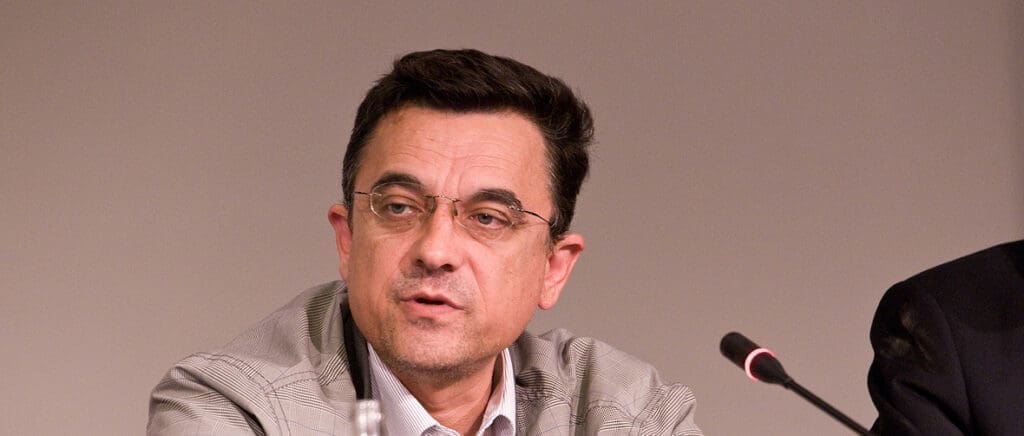Defamation may have been decriminalised in Macedonia in 2012 – removing the threat of a prison sentence – but journalists are still cautious about writing critical stories. They can still get sued for defamation and they face the possibility of paying extortionate damages. In one of the poorest countries in Europe, where the few remaining independent journalists are already strapped for cash, such rulings could force them out of the profession completely.
Dejan Georgievski is the president of the Media Development Centre, MLDI’s partner in Macedonia. “Right now, power is held by a strongly authoritarian government,” he explains. “It has very little tolerance for different opinions and for criticism of its policies. Defamation law is used as a tool for putting pressure on the media. It’s pushing journalists towards self-censorship with the threat that they may be sued.”
The Media Development Centre closely monitors defamation cases and has discovered a worrying trend: certain judges are applying defamation law inconsistently, depending on the parties involved.
Nani Jansen from MLDI summarises: “If a case involves a public official or someone close to the political powers that be, cases get decided in favour of the plaintiff, even though European Court of Human Rights standards are being violated. However, when it’s just regular people suing each other, the same judges are perfectly capable of applying the correct European Court standards. It’s a very selective way of applying the law.”
A recent case involving the independent magazine Fokus brings to light this inconsistent application of defamation law.
While most mainstream media is under government control in Macedonia, Fokus has stayed true to its independent, investigative roots which were laid down by founder Nikola Mladenov in 1995. Despite its increasingly weak financial situation and, in 2013, the death of Nikola Mladenov in a car accident in circumstances that remain unclear, Fokus remains defiant.
“From the moment it was established, Fokus declared itself as the public voice of both internal and external enemies,” says Dejan. “It has never shied away from exposing abuses of power and public funds.”
When Fokus was sued by the head of Macedonian counterintelligence services in January 2013, the judge ruled that Fokus was responsible for defamation and ordered it to pay €9,000 in damages and fees. But when former broadcaster Robert Popovski was sued for defamation – also in January 2013 – by a central heating company, the same judge dismissed and overturned the claims of the plaintiff.
“These were two very similar cases which both came down to reporting the words of others. Yet we had the same judge ruling in totally opposed ways,” says Dejan. “The general perception is that this is because in the Fokus case, the plaintiff was a public figure.”
If this was an attempt by the government to bring the already impoverished Fokus to its knees, it was unsuccessful. Macedonian citizens and journalists clubbed together to pay the damages, proving to Dejan that “There is still some solidarity in Macedonia.”
Fokus’s lawyer, Filip Medarski, is working with the Media Development Centre through a successful legal defence programme that is funded by MLDI. This programme is a vital safety net for Macedonian journalists. It gives them the confidence to report on contentious issues, knowing that they can access free legal assistance should they need it.
In the meantime, and despite the support offered by the legal defence programme, the Fokus case and others like it has had a chilling effect on the media. Filip Medarski has seen an increase in calls from journalists asking for advice about what they can publish even before they’ve put finger to keyboard. Without the legal defence programme, very few journalists would be able to cover the costs of a law suit and as a result they simply wouldn’t take the risk.
The Fokus case is now on its way to the European Court of Human Rights. “We believe we will win there,” says Dejan.
“A decision by the European Court will hopefully make public officials think twice before filing defamation lawsuits against journalists who are, after all, just doing their jobs – informing the public about matters of public interest.”
Nani adds: “It is important that cases such as that of Fokus are litigated all the way to the European Court. The decisions from Strasbourg will send a clear signal to the Macedonian courts to be consistent in the correct application of freedom of expression standards. This should eventually trickle down the system and contribute to a media climate that is freer and fairer for everyone.”
Recent Case Studies
Biased rulings in defamation cases
The precarious state of press freedom in Turkey, entwined with a deteriorating democratic environment, poses significant challenges to journalists. Increasingly they face arbitrary arrests, legal threats, and increasing violence in their pursuit of reporting truth. In response to these threats, the Media and Law Studies Association (MLSA), our partner, actively defends press freedom and human […]
Biased rulings in defamation cases
23 October 2023 marks one year since the killing of prominent Pakistani journalist and news anchor for Pakistani broadcaster, ARY News, Arshad Sharif. Sharif was fatally shot at close range by Kenyan Police at a roadblock near Nairobi. To this day, a transparent, independent and effective investigation into the circumstances of his death has not […]
Biased rulings in defamation cases
November 2nd marks the International Day to End Impunity for Crimes Against Journalists. The threats and dangers that constitute a stark reality for many journalists reinforce the importance of this day. Every year journalists are killed, tortured, and harassed for carrying out their work. Over 1,600 journalists have been killed since 2003 with a sharp […]



